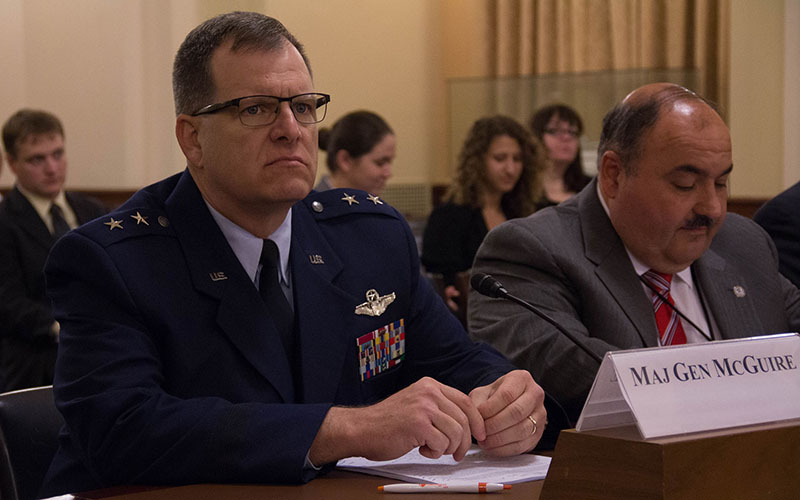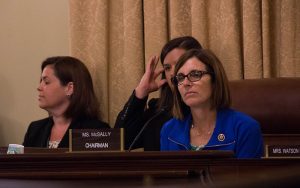
Maj. Gen. Michael McGuire of Arizona’s National Guard and Jimmy Gianato of West Virginia’s Division of Homeland Security faced questions from a House panel on the relationship between state and federal emergency response officials. (Photo by Nick Wicksman)
WASHINGTON – The leader of Arizona’s National Guard joined other state officials who told a House subcommittee Wednesday that the Guard is integral to natural disaster response and recovery, and deserves continued support from the Pentagon.
Arizona Maj. Gen. Michael McGuire said that his units, like others across the country, perform “critical domestic response duty while simultaneously engaging in combat operations around the globe.”
Defense and federal emergency agencies told a House Homeland Security subcommittee that they are working to better collaborate with the local forces.
But lawmakers seemed to have doubts.
Rep. Martha McSally, an Air Force veteran, said her experience when working at international disaster sites is that, “There’s turf battles, there’s misunderstandings, there’s not a unity of effort.”

Rep. Martha McSally, R-Tucson, questioned state and federal officials about interagency collaboration dealing with domestic emergency situations. (Photo by Nick Wicksman)
The Tucson Republican said she sees the same thing happening domestically.
“I would imagine … we have similar dynamics that could happen here at home in response to an emergency,” McSally said.
Deputy Assistant Defense Secretary Robert Salesses conceded that there is room for improvement.
“There’s a tremendous evolution in the Defense Department in understanding its responsibilities for defense support to civil authorities,” Salesses testified, adding that there is “a lot of work underway to continue to educate” federal officials.
McGuire, the adjutant general of the Arizona Guard, said that effort is overdue.
“Despite the additional resources that the DOD brings, its support to civil authorities is slow and mission assignment cumbersome,” McGuire said in his prepared statement.
He was joined at the hearing by emergency management officials from Rhode Island and West Virginia, while Salesses testified along with officials from the Federal Emergency Management Agency and the Government Accountability Office.
McGuire testified that when a federal agency gets involved or allocates resources to fighting a local emergency, that assistance “does not transfer command and control of the incident to the DOD.” But he said federal officials often act as if it does.
While the hearing was called to discuss “Defense Support of Civil Authorities … in the Nation’s Homeland Security Missions,” cybersecurity was on the minds of many lawmakers at the hearing.
Less than a week after the Office of Personnel Management announced a data breach that could have reached personal records of up to 4 million federal employees, subcommittee members pressed the federal witnesses on policies and actions in place to both prevent and deal with such attacks.
While Salesses and the other deferred, McGuire said the Guard already has policies in place should a cyberattack happen.
“We have a very robust cyber-exercising capability,” he said, noting that the Arizona Guard successfully completed a statewide cyberattack training exercise last week.
While the Guard generally responds to “an emergent incident,” it also has the capability to help implement defensive measures to keep attacks from happening, McGuire said.
McSally added that in the cyber world there needs to be “much greater clarification in roles and responsibilities,” should federal agencies get involved in responding to cyberattacks.